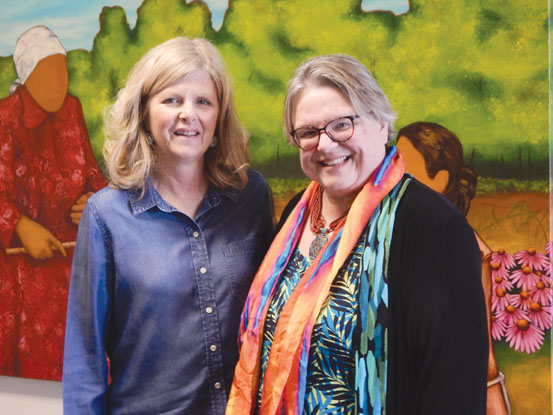
Kramer keeps moving on
New nursing programs make dreams come true
story and photo by James Coburn, Staff Writer
New additions are coming to Kramer School of Nursing at Oklahoma City beyond their traditional curriculum with their RN to BSN program. The programs are designed to help many nursing students move forward in their careers.
Kramer will also begin live-streaming of some of their gradate programs, said Dr. Liz Diener, RN, chair of graduate programs.
The RN to BSN program is not new at Kramer but it will be offered at Duncan Regional, said Professor Denise Burton, RN, chair of the RN to BSN education program. Kramer recently had an open house at the hospital.
“For us it’s just merely a change of site,” Burton said. “We’re in Ardmore and will soon be in Duncan in the fall and here in Oklahoma City,” Burton said. “I think we are reaching out to those rural communities. My best example is the work we’ve done in Ardmore.
“You can’t go to any department at Mercy in Ardmore and not see our graduates. So we’ve really strengthened their climb on the education ladder.”
Several Kramer graduates already work in Duncan, including Cindy Rauh, RN, who serves at chief nurse officer at Duncan Regional. The same faculty that teaches in Oklahoma City will also teach in Duncan.
“I think that really strengthens our program,” Burton said.
Most of the RN to BSN students are currently working. They range in age from 35 to maybe 55, Burton added. They gravitate toward the face-to-face nursing classes. However, their general education courses are offered online.
“We’re there to help them if they’ve never taken an online course,” Burton added.
Enrollment is underway for Duncan and the Oklahoma City campus. The RN to BSN program in Duncan will be offered half-a-day a week and the program lasts for two semesters. For Duncan it will begin in August. Ardmore begins in January, she said.
“Oklahoma City starts every August and every January,” Burton said.
Diener said Kramer will begin live streaming in the fall for its nursing programs in education and nursing leadership. This particular program has been offered at the Oklahoma City campus for many years.
“It requires an on-campus presence half-a-day a week, every other week. Or depending on your course frequency or schedule, it could be a half day every week,” Diener said.
This can be a hardship for students living in far away rural areas as they have driven to Oklahoma City University from as far away as Duncan and Ardmore. That can pose a long day for them as it impacts their working schedule, Diener said. So the live streaming will make it easier for students by offering additional flexibility.
“We will have the ability with the courses we now offer to live stream that. We’re going to use Skype for Business,” Diener continued. “Students will be able to join the class virtually through the live streaming. For communities that are rural and are too far to drive, they will be able to work on their masters degree.”
Having an in-class group will always be valued at Kramer as well. It will merely be an online program to provide face-to-face time for students advancing their careers in nursing. They will be able to achieve their dreams.
Kramer is also hiring faculty for a new program in the fall for the BSN to DNP (Doctor of Nursing Practice degree) program for the nurse practitioner, Diener said.
“This fall we will be offering an acute care track, and it has a two-fold practice,” she explained. “One is there are a lot of family nurse practitioners or adult nurse practitioners out there, who work in primary care in rural communities.”
They are responsible for going to the small hospitals in the rural communities to see patients or to perform a shift in the emergency room. The Oklahoma State Board of Nursing wants the nurse practitioners to be prepared to handle these acute care challenges.
“So in order for these advanced nurse practitioners to continue, they need to have specific education for the acute care environment,” Diener explained. “So we are offering both a post masters certificate in the acute care track and then the full bachelor’s to DNP program to those who know their primary call to work is going to be in acute care facilities as opposed to primary care in an individualized practice.”
Kramer will be starting with a small group of these nursing professionals this fall. Inquiries about the program have already started for Kramer. Diener expects quite a number of applicants will respond to the program.
“It’s going to be relatively competitive,” Diener said. “But then as we grow, the program will grow as well. But there is a real call for it as we have people already calling saying, ‘Wow. Yes, put me in it.”












